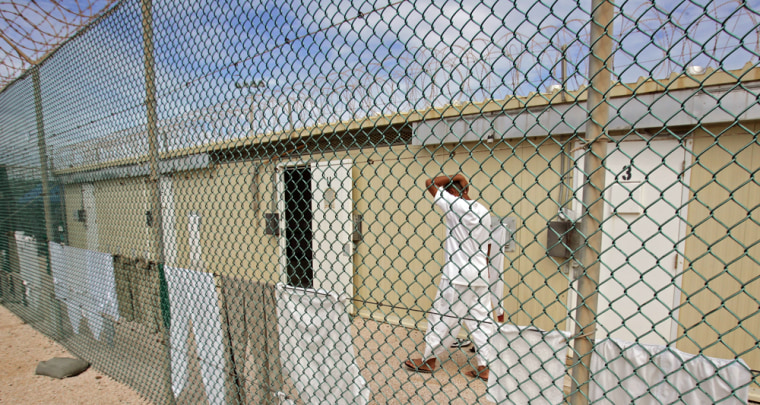The Bush administration argued in the Supreme Court on Wednesday that foreign terrorism suspects held at Guantanamo Bay have sufficient opportunities to challenge their confinement, the third round of high court review of the detentions.
The measures set out in U.S. law for the 305 men to contest their detention is a "remarkable, remarkable liberalization" of the protections historically afforded foreigners held by the United States somewhere other than on U.S. soil, said Solicitor General Paul Clement.
But attorney Seth Waxman, representing the detainees, portrayed the case as a fundamental test of the U.S. system of justice. Many of the prisoners "have been held ... for six years," he said.
Under the current system, "they have no prospect" of being able to challenge their detention in any meaningful way, said Waxman, who held Clement's job during the Clinton administration.
The justices, who ruled for the detainees in two prior decisions, subjected both Clement and Waxman to a barrage of questions.
Most justices seem to accept some rights
Chief Justice John Roberts and Justice Antonin Scalia pressed Waxman on whether the detainees are entitled to hearings in civilian courts.
"Show me one case" down through the centuries where circumstances similar to those at Guantanamo Bay entitled an alien to challenge his detention in civilian courts, said Scalia.
Roberts challenged Waxman's argument that the duration of detention is important.
But most questions from the justices seemed to accept that the detainees have some rights and focused on whether procedures in place are adequate.
Justice Anthony Kennedy, considered a pivotal vote in the case, raised the possibility of returning the issue to the U.S. Court of Appeals for the District of Columbia Circuit, where the detainees' status as enemy combatants is undergoing a highly restrictive form of review.
Waxman argued that such a move would simply cause more delays in deciding the prisoners' fate. Clement said the appeals court would be an appropriate forum for resolving the issue.
Lawyers for the foreign detainees contend the courts must get involved to rein in the White House and Congress, which changed the law to keep the detainee cases out of U.S. courts after earlier Supreme Court rulings. The most recent legislation, last year's Military Commissions Act, strips federal courts of their ability to hear detainee cases.
Waxman, the top Supreme Court lawyer during the Clinton administration, said that "after six years of imprisonment without meaningful review, it is time for a court to decide the legality" of their confinement.
Protestors and spectators
The detainee case drew several hundred spectators who lined up outside the courthouse in a light snow. About 50 had camped out overnight for a chance to get inside to hear the arguments in the third case the Supreme Court has heard since 2004 on the administration's detention program.
Meanwhile, two dozen protesters, some in orange prison-like jumpsuits, chanted and waved signs.
"Restore habeas corpus!" they intoned, referring to the right to court review of the legality of detention, the heart of the argument before the high court.
Clement said foreigners captured and held outside the United States "have no constitutional rights to petition our courts for a writ of habeas corpus," a judicial determination of the legality of detention.
The case could turn on whether the court decides that Guantanamo is essentially U.S. soil, which would make the case for detainee rights stronger. Kennedy said as much in a concurring opinion in Rasul v. Bush, the 2004 case that was the court's first foray into the administration's detention policies.
"Guantanamo Bay is in every practical respect a United States territory," Kennedy said in the earlier ruling.
The administration also argues that panels of military officers that review the detainees' status as enemy combatants are adequate, even if the Supreme Court decides they have the right to contest their confinement.
The justices, however, decided to review the issue in June, after having turned down the detainees' appeal in April. They provided no explanation, but their action followed a declaration from a military officer who criticized Combatant Status Review Tribunals.
The United States has no plans to put most of those held at Guantanamo on trial. Just three detainees face charges under the Military Commissions Act and the military has said it could prosecute as many as 80.
The consolidated cases are Boumediene v. Bush, 06-1195, and Al Odah v. U.S., 06-1196.
